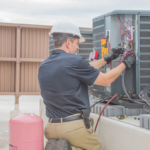When it comes to maintaining a comfortable home environment, few systems are as essential as your HVAC setup. Whether it’s the sweltering heat of summer or the icy chill of winter, your air conditioner and furnace play critical roles in regulating your indoor climate. However, like all mechanical systems, HVAC units require regular maintenance and occasional repairs to keep running efficiently. Understanding the importance of air conditioning repair and furnace repair can help you avoid costly breakdowns and ensure your system lasts for years.
Why Air Conditioning Repair Matters
During the hotter months, your air conditioner is your best defense against high temperatures and humidity. However, many homeowners don’t realize something is wrong with their AC system until it stops working entirely. Addressing small issues early with professional air conditioning repair can prevent larger, more expensive problems down the line.
Common Signs You Need AC Repair:
- Warm Air: If your unit is blowing warm or room-temperature air, it could indicate low refrigerant levels, a compressor issue, or airflow restrictions.
- Weak Airflow: Poor airflow often points to clogged filters, ductwork problems, or a failing fan motor.
- Frequent Cycling: If your AC turns on and off frequently, it’s working harder than necessary—often due to a faulty thermostat or oversized unit.
- Unusual Noises: Banging, squealing, or rattling sounds usually mean there’s something wrong inside the unit.
- High Energy Bills: A sudden spike in your electric bill could mean your air conditioner is running inefficiently and needs attention.
By scheduling air conditioning repair at the first sign of trouble, you can keep your system running efficiently and reduce energy consumption.
Furnace Repair: Don’t Wait for Winter
While your air conditioner works overtime in the summer, your furnace is essential during colder months. Delaying necessary furnace repair not only risks your comfort but can also pose safety hazards, especially if the problem involves gas lines or electrical components.
Signs You Need Furnace Repair:
- Strange Odors: A musty or burning smell could indicate mold in the ducts or a mechanical issue.
- Pilot Light Issues: If your pilot light is flickering or discolored (not a steady blue), this can be a sign of a ventilation problem or gas issue.
- Insufficient Heat: If your home isn’t getting warm enough, the furnace may have a broken blower fan, clogged filter, or a malfunctioning thermostat.
- Unusual Noises: Similar to AC units, clanking, banging, or whining sounds can signal mechanical problems.
- Short Cycling: This occurs when your furnace turns on and off too quickly, often due to overheating or thermostat issues.
Regular furnace repair not only helps keep your home warm but also ensures your system runs safely and efficiently during the coldest months.
The Risks of Delayed Repairs
Postponing air conditioning repair or furnace repair can lead to larger system failures, higher energy bills, and even health and safety concerns. For example, a malfunctioning furnace could lead to carbon monoxide leaks, which are extremely dangerous and often undetectable without the proper equipment.
Other risks of delayed repairs include:
- Complete System Failure: Ignoring minor issues can cause major damage that requires full system replacement.
- Reduced Efficiency: Faulty components force your system to work harder, increasing wear and tear.
- Poor Air Quality: Dirty filters, leaking ducts, and mold growth can affect indoor air quality and trigger allergies or respiratory problems.
- Higher Repair Costs: Minor issues can usually be fixed quickly and affordably. Once they escalate, however, you may be looking at extensive labor and parts replacement.
The Benefits of Preventive Maintenance
While urgent air conditioning repair or furnace repair is sometimes unavoidable, regular maintenance can dramatically reduce the need for emergency calls. HVAC professionals recommend having your AC unit serviced in the spring and your furnace inspected in the fall.
During a maintenance visit, a technician will:
- Clean or replace filters
- Inspect ductwork for leaks
- Lubricate moving parts
- Check refrigerant levels or fuel connections
- Calibrate thermostats
- Test system efficiency and airflow
This proactive approach can catch small issues before they become big problems, improve energy efficiency, and extend the life of your system.
Choosing the Right HVAC Repair Company
When you’re in need of air conditioning repair or furnace repair, it’s essential to choose a reputable, experienced service provider. Here are some key qualities to look for:
- Licensing and Insurance: Ensure the company is licensed and fully insured to perform HVAC work in your area.
- Experience: Look for a team with years of hands-on expertise dealing with a wide range of HVAC systems.
- Transparent Pricing: A good company will offer upfront pricing and clear estimates before beginning any work.
- 24/7 Emergency Service: HVAC problems don’t always occur during business hours. Choose a provider who offers emergency support when you need it.
- Customer Reviews: Check online reviews and testimonials to gauge customer satisfaction and reliability.
Whether it’s a simple fix or a major system overhaul, working with a professional ensures the job is done safely and correctly the first time.
Conclusion: Comfort Starts with Reliable Repair
Your home’s heating and cooling systems are essential to your comfort, health, and safety. Ignoring the need for air conditioning repair in the summer or furnace repair in the winter can lead to more than just inconvenience—it can result in major expenses, health risks, and system failure.
By paying attention to warning signs, scheduling regular maintenance, and working with a trusted HVAC professional, you can ensure your home remains comfortable and energy-efficient all year long. Don’t wait until your system breaks down. Stay ahead of the seasons and invest in timely, professional HVAC repair services.

